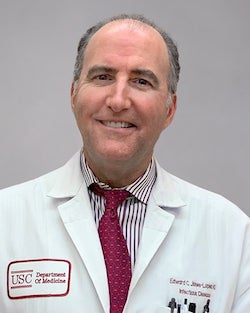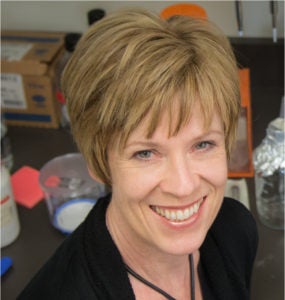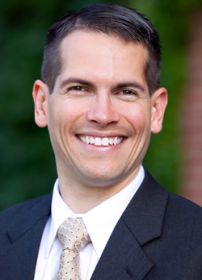USC experts discuss the company’s — and its competitors’ — vaccine technologies, potential regulatory hurdles and when a vaccine may be available to the public.
Contact: Jenesse Miller, (213) 810-8554 or jenessem@usc.edu
Ethical issues could complicate development of other vaccines
 “While the data details are not clear at this time, there is no way not to celebrate this as a monumental achievement and a great first step forward towards controlling this devastating pandemic,” said Edward Jones-López, a Keck School of Medicine of USC infectious diseases expert and investigator of one of the Operation Warp Speed vaccine clinical trials. “If the 90% efficacy estimate is corroborated, the efficacy of this vaccine will be among the highest when compared to other very successful vaccines.”
“While the data details are not clear at this time, there is no way not to celebrate this as a monumental achievement and a great first step forward towards controlling this devastating pandemic,” said Edward Jones-López, a Keck School of Medicine of USC infectious diseases expert and investigator of one of the Operation Warp Speed vaccine clinical trials. “If the 90% efficacy estimate is corroborated, the efficacy of this vaccine will be among the highest when compared to other very successful vaccines.”
“The trickiest issue is to determine how the Pfizer vaccine — and other front runner candidates such as Moderna — results will affect the ethical and scientific integrity of the other ongoing vaccine studies. The approval of a vaccine, even under emergency use standards, is likely to disturb the equipoise — or balance of interests — that allows researchers to compare other vaccine candidates to a placebo.
“This tension, which is very unique to this moment, is likely to complicate several of the ongoing studies and potentially threaten their scientific and ethical integrity. Despite this, there’s an obvious need to develop more vaccines to address the global need.”
For a Q&A with Dr. Jones-Lopez, click here.
Contact: edward.jones@med.usc.edu
The partisan divide on requiring a COVID-19 vaccine
 “For any vaccine to work on a large scale, the government and the people will have to be willing and ready to take the vaccine,” said Christian Grose, an associate professor of political science and public policy at the USC Dornsife College of Letters, Arts and Sciences and academic director of the USC Schwarzenegger Institute for State and Global Policy.
“For any vaccine to work on a large scale, the government and the people will have to be willing and ready to take the vaccine,” said Christian Grose, an associate professor of political science and public policy at the USC Dornsife College of Letters, Arts and Sciences and academic director of the USC Schwarzenegger Institute for State and Global Policy.
“In responding to a new USC Schwarzenegger Institute poll, a majority of voters supported a law that would require that a COVID-19 vaccine be given to all California residents. But there is a significant partisan divide, which is troubling from a public health standpoint. This suggests we will need not only a vaccine, but a significant bipartisan messaging campaign about the importance of a vaccine.”
Contact: cgrose@usc.edu
Pfizer vaccine would need to be kept cold
 “The Pfizer vaccine is based on RNA, small snips of genetic material with the instructions to make coronavirus spike proteins once injected into a body,” said Paula Cannon, Distinguished Professor of Molecular Microbiology & Immunology at the Keck School of Medicine of USC. “But RNA is very unstable, and the vaccine needs to be at extremely low temperatures all the time.
“The Pfizer vaccine is based on RNA, small snips of genetic material with the instructions to make coronavirus spike proteins once injected into a body,” said Paula Cannon, Distinguished Professor of Molecular Microbiology & Immunology at the Keck School of Medicine of USC. “But RNA is very unstable, and the vaccine needs to be at extremely low temperatures all the time.
“This creates a problem both for transportation, as well as storage in a pharmacy or doctor’s office. Initial rollout may well be restricted to large centers that can provide this temperature capability. Hoped-for advances in the chemistry of RNA may provide a version in the future that is stable under less extreme temperatures.”
Contact: pcannon@usc.edu
Any vaccine must be assessed for safety and efficacy
 “The company would likely seek an Emergency Use Authorization from the U.S. Food and Drug Administration based on the results of the interim analysis,” said Eunjoo Pacifici, an associate professor and Chair of the Department of Regulatory and Quality Sciences at the USC School of Pharmacy. “According to the FDA guidance document, the agency expects to convene an open session of its advisory committee meeting to discuss the adequacy of available safety and effectiveness data to support the authorization.”
“The company would likely seek an Emergency Use Authorization from the U.S. Food and Drug Administration based on the results of the interim analysis,” said Eunjoo Pacifici, an associate professor and Chair of the Department of Regulatory and Quality Sciences at the USC School of Pharmacy. “According to the FDA guidance document, the agency expects to convene an open session of its advisory committee meeting to discuss the adequacy of available safety and effectiveness data to support the authorization.”
“The FDA has provided the industry with clear guidance outlining the requirements for safety and effectiveness before a vaccine is authorized for emergency use. It is important to keep in mind that the only way to ensure long term safety efficacy of a product is to assess safety and efficacy long term.”
Contact: epacific@usc.edu
Pfizer’s was a ‘high-risk, high-reward effort’
“Unlike other drug companies contracting with the United States under Operation Warp Speed for the development of a COVID-19 vaccine, Pfizer (and its German partner BioNTech) took no money for R&D,” said Shon Hiatt, an associate professor at the USC Marshall School of Business who researches entrepreneurship, strategy, regulatory affairs, and business sustainability.
“This has freed the company from not only bureaucratic red tape during its Phase 1-3 trials that could have slowed the process, but also reduces the potential for future litigation against ownership issues and application of IP developed from the vaccine. Under Operation Warp Speed, Pfizer signed a $1.95 billion contract with U.S. government for distribution of 100 million doses, and can negotiate a contract for another 500 million more doses.
“So far, Pfizer has invested over $1.5 billion in the development of the vaccine. This was a high-risk, high-reward effort with an extremely quick drug development time period. If the high efficacy stands, this could be a financial win for Pfizer and even a greater reputational win for the company.”
Contact: shiatt@marshall.usc.edu




